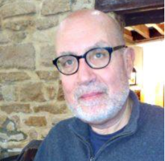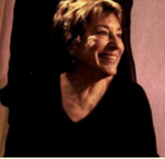Translated from the Italian by Brenda Porster
All dishevelled, she comes through the woods along the path joining her house to ours, brandishing a newspaper and shouting, cholera! cholera! And indeed the front page announces three or four cases in Naples, maybe even ten – along with mussels, vibrio bacteria, panic. But if it’s like that in Naples what will happen in Palermo? (she wails, dragging out the last word into a terrifying chasm: Palieaimmo….). Palermo, as everyone knows, is a smaller and more violent Naples, anciently and perniciously hysterical, swarming with dusty picciridazzi[1]. For sale on the street there are slabs of spleen still stinking of blood, sea urchins – we’d eaten a bellyful the night before, our uncle had brought them – and a thousand other kinds of yuck from the sea, always and forever eaten raw (the stinking spleen, picciriddazzi, binging on sea urchins, crazy ! crazy! crazy!…). The epidemia is a certainty. They’ve already blocked ships sailing to the continent, trains both from and for, but mainly “from”, and the ship, too, because while we’re here talking, tens, hundreds, of dead bodies are piling up in Naples – even if it’s obvious that they can’t write about this yet in the newspaper she’s still waving as proof. The other adults seem sceptical – some out of bravado (the famous uncle who’d come down from Palermo announces flambuoyantly that he’ll soon go back to town because he’s dying for some live mollusks, the kind you have to sink your teeth into to break their will, at Mondello, on the boardwalk); others as a way of exorcizing their fear – well, in any case, children, go and wash your hands… and everyone makes fun of her, more or less good-naturedly. After all, the papers invite us to stay calm, and she’s always been known to be a fanatic – Cassandra, Cassandra… . Everyone, but not us children, we run to wash our hands and then here we are, outdoors again, in the shade of the mulberry tree, kneeling at her feet, her hair all in a tangle as usual, her robe half-open, heaping up dead bodies and disaster on the streets of Naples, no, of Palermo, Paleaimmo, scenes of horror, rivers of body fluids and shit, then hordes of rats, the famous voracious rats ri Paleaimmo. By now the cholera is bubonic plague, cartfuls of dead bodies, but some still alive, in their death throes, or buried by mistake, drawn by drooling men, more drool than men, ringing a cowbell, sneering demons spared by the epidemia, the apocalypse. Hypnoses of terror, ours, but also: enchanted attraction… . We, the children, are the tribe, ants flying in swarms as fast as night, and the feeling inside us is too strong, we can’t even pretend it’s not, even if we hide it, of course, for fear they’ll think we’re crazy and separate us, so we put on a mask of terror, play at being struck dumb, only once in a while, at the right moment, when the story seems about to fade out, sated, a simple question, as bait, now one, now another – but are you sure ? to open up the flow again, the waves of pain and shit and death, while the yellow of the deepening afternoon melts into the blue of the sky, into green and pink and red on the distant horizon of the sea, blending in with the last of the sunlight, the twinkle of the first stars, to blend into a color never seen before: blue – and a warm, sweet caress enfolds us. Nous sommes comblés.[2]
So this is happiness then ? Children crying mommy, mommy, while the cart moves away? and the people dead? the adults? The desolation of others? Their grief ? No, certainly not, that’s not it – still (how to explain it ?), our conscience is clear, inside ourselves we don’t feel indignation or blame, but outside (we hear), on the roof, dormice scampering up and down. It’s dark by now, the stars the sky the distant sea have all been swallowed up, there’s no more sea, no sky, no stars, but (how is it possible?) that blue is still there, all alone, it’s everything, it’s an ongoing sound, visible, an impenetrable, enveloping sphere with us inside, it’s blue. We’ve taken refuge in the attic to watch it better, on our backs, through the large slanting window, the whole tribe, and our thoughts scamper back and forth, as if in unison, and we can’t get to sleep: yes, we are happy. Outside, the dormice run back and forth, we can hear them, and we hear our thoughts, too, bum… bum… bum…, as though we were a single large head tracing extraordinary events that will change, as in a dream, the routine of life: to leave sunny Sicily, where we all live together, a community of children and adults who play always and only together, and then separate again, school, work, no longer together, to grow up (that’s life)… all this will be, is, already, impossible. We’re under siege – and the esplanade, the Castle, with its pathways branching out to embrace our other properties (here we’re the only ones who run along the pathways, and the space seems infinite), becomes in our imagination an unassailable land, where it’s always summer and where disease, and death, and time passing, are unknown. And then, we think (always), with hands held tight to form a human chain, and the thoughts are words that don’t need to be said out loud, if it attacked us (the disease, death, time passing), we’d fight – after all, isn’t that what Ajax and Achilles and the Amazons (whose beloved adventures have forever been wound up into ours) had done? (It goes without saying that our real hero is The Horse Tamer, but his name can’t be pronounced or written – we are Trojans…). In that case we’d live on, but as heroes, we’d fight together, the danger coming from nature would unite us, we’d live, yes, through pranks and feats of prowess, as heroes, among the gods and goddesses, or else as heroes we’d die: all standing around and rubbing the body of the dying warrior, which turns blue, the color blurs and as it blurs the heroes who are helping turn blue, too, a blue wave spreads gently over everything, now that the other is dead they help her, or him, and he, or she, blends into the others, floating like icebergs, all together once again, in our sea, and the sky, the stars: blue. Isolated, blocked and attacked, we fight, the disease, our place, that magnificent place, but we’ve fallen, the disease, love is stronger, or maybe not, blue, yes, we’d die in the end, we’ll die, or we are dying, our hands still woven together in a chain like an everlasting picture, dying … d y i n g … . And finally – but how? but when? – together, the swarming calms down, we fall asleep, the noise of the dormice cradles us, our fading thoughts become a single shared dream, the sense of a warm caress envelops us. We are blue.
That was many years ago – because, yes, luckily in the end the epidemia didn’t amount to much, in fact it never really got started. We returned to the continent a few days later, summer was over, time had started to run its normal course and colors went back to being kind and friendly, too. The tribe broke up, scattered into the world and into life, many really have died, even if not of plague, but none of us returned to the Castle. Yet (and, after all, is it really so strange?) when, over time, I’ve happened to meet up with one of those bygone heroes, whether he, or she, was by then in the thick of things, a leader of people and events, or had retired to cultivate a vegetable patch, instead of asking about one another’s lot in life, as if by magic, at once, and always, we find ourselves re-evoking that night. As though it had been the peak of an unreachable happiness. Blue.
[1] picciridazzi – brats in Sicilian dialect
[2] Nous sommes comblés: We are fulfilled



























0 Comments